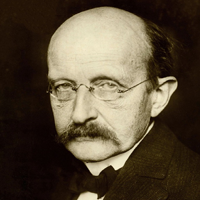Max Planck
Max Karl Ernst Ludwig Planck, ForMemRS was a German theoretical physicist whose discovery of energy quanta won him the Nobel Prize in Physics in 1918.
Planck came from a traditional, intellectual family. His paternal great-grandfather and grandfather were both theology professors in Göttingen; his father was a law professor at the University of Kie and Munich. One of his uncles was also a judge.In 1867 the family moved to Munich, and Planck enrolled in the Maximilians gymnasium school, where he came under the tutelage of Hermann Müller, a mathematician who took an interest in the youth, and taught him astronomy and mechanics as well as mathematics. It was from Müller that Planck first learned the principle of conservation of energy. Planck graduated early, at age 17. Max Karl Ernst Ludwig Planck, was a German theoretical physicist whose discovery of energy quanta won him the Nobel Prize in Physics in 1918.
Planck made many substantial contributions to theoretical physics, but his fame as a physicist rests primarily on his role as the originator of quantum theory,[5] which revolutionized human understanding of atomic and subatomic processes. In 1948, the German scientific institution Kaiser Wilhelm Society (of which Planck was twice president) was renamed Max Planck Society (MPS). The MPS now includes 83 institutions representing a wide range of scientific directions.

Max Planck
Date of Birth: 23 Apr 1858
Birth Place: Kiel, Germany
Proffession: German physicist
Nationality: German
Death: 4 October 1947, Göttingen, Germany


